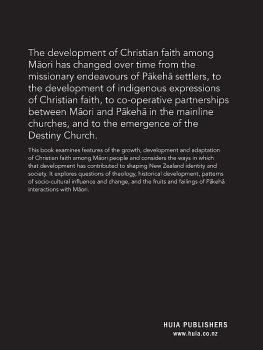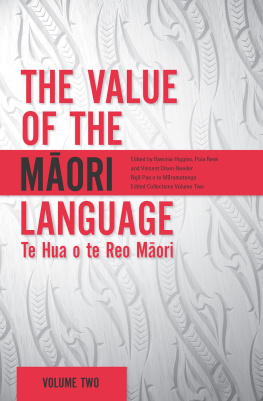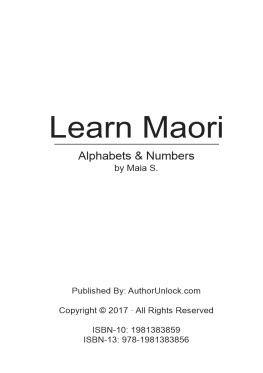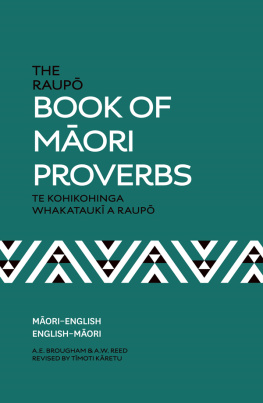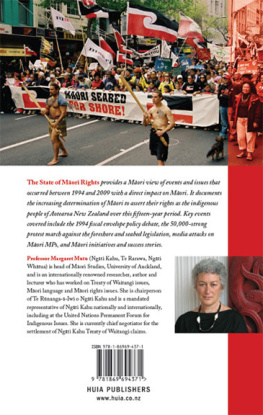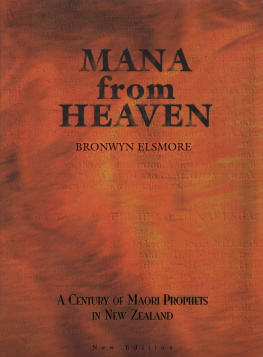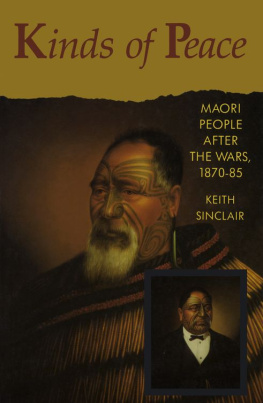Contents
Guide
Page List
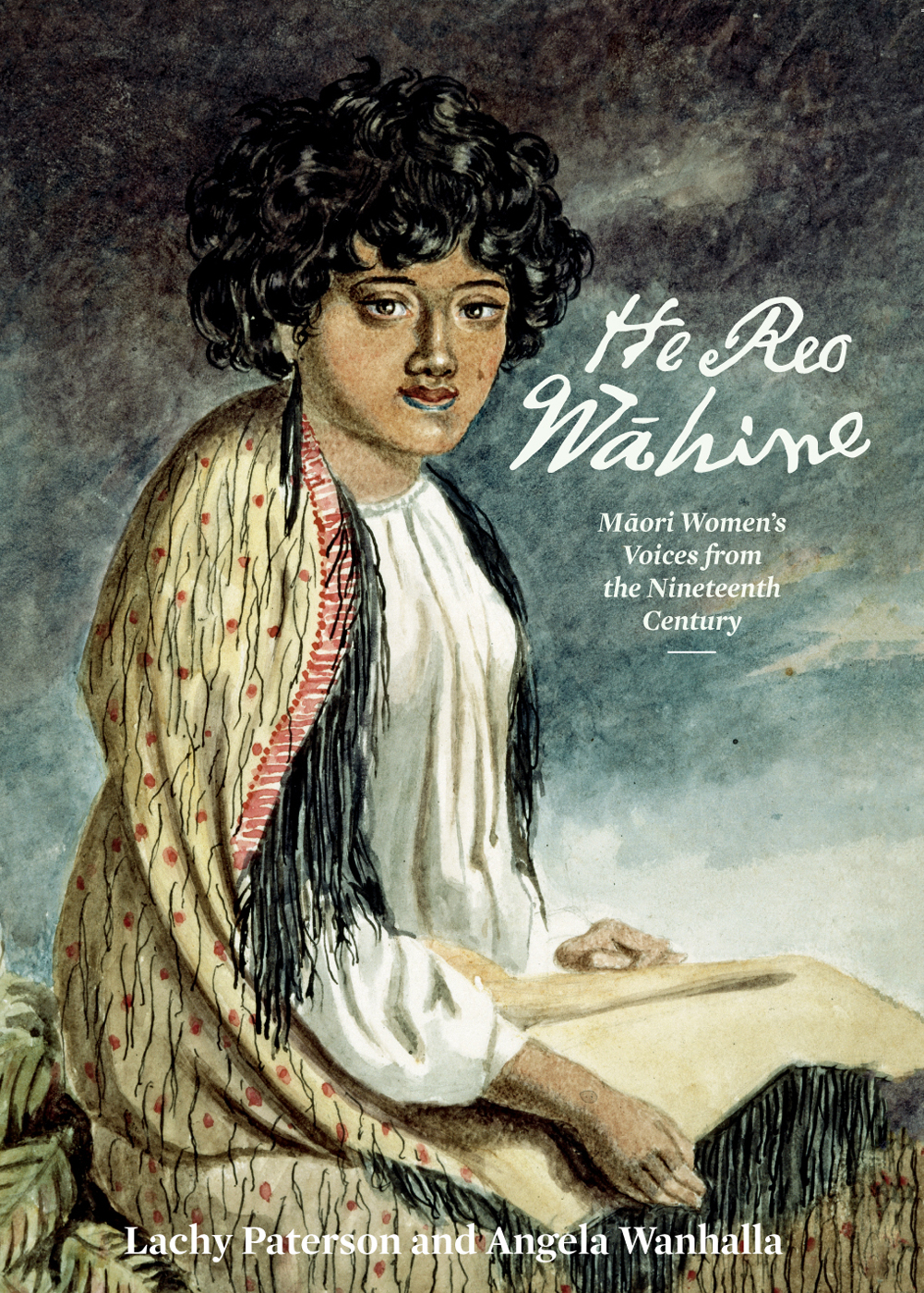
This book presents a rich and ranging collection of Mori women speaking from the nineteenth-century archive. It is in various measures an inspiring, instructive and agonising read.
CHARLOTTE MACDONALD, VICTORIA UNIVERSITY OF WELLINGTON
He Reo Whinebrings together a wide range of nineteenth-century Mori womens voices. The extensive excerpts which fill its pages make for a rich, generative reading experience.
ARINI LOADER, VICTORIA UNIVERSITY OF WELLINGTON
Lachy Paterson is an associate professor in Te Tumu: School of Mori, Pacific and Indigenous Studies at the University of Otago, where he teaches Mori language and Mori history. Extensively utilising Mori-language textual materials, he has published widely on Mori history of the colonial period, including a monograph on Mori-language newspapers, Colonial Discourses: Niupepa Mori, 18551863 (Otago University Press, 2006).
Angela Wanhalla is an associate professor in the Department of History and Art History at the University of Otago. Her research sits at the intersection of race, gender and colonialism, with a particular interest in histories of race and intimacy within and across colonial cultures. Her most recent book, Matters of the Heart: A History of Interracial Marriage in New Zealand (Auckland University Press, 2013), was awarded the Ernest Scott Prize by the Australian Historical Association for the most distinguished contribution to the history of Australia or New Zealand. Her current project, which is funded by a Royal Society of New Zealand Rutherford Discovery Fellowship, is concerned with the politics of intimacy in New Zealand.
He Reo Whine
Mori Womens
Voices from the Nineteenth
Century
Lachy Paterson and Angela Wanhalla

CONTENTS
ACKNOWLEDGEMENTS
This book has been a number of years in the making, beginning as a discussion in 2009 between two scholars of Mori history one with expertise in Mori-language sources, the other in womens history who wondered if these two strands could be brought together. The He Reo Whine project really got under way when the University of Otagos Humanities Division funded a summer scholarship, which allowed us to employ Alexandra King in 2010 to provide research assistance to help identify sources. That financial support and Alexandras impressive archival research skills laid the foundations for this project, making us realise that our idea could be turned into reality. Both authors also thank the University of Otago for granting a period of research and study leave in 2014 during which time much of the book was written.
We are indebted to New Zealands libraries, archives and museums, and the people who care for their holdings. In particular, we thank the Alexander Turnbull Library (National Library) and all offices of Archives New Zealand from whose significant and valuable holdings we have drawn much of our primary material. We also acknowledge the Hocken Collections (University of Otago), Auckland War Memorial Museum, Sir George Grey Special Collections (Auckland City Libraries), Museum of New Zealand Te Papa Tongarewa Archives, Puke Ariki Research Centre (New Plymouth City Council), Christchurch City Libraries Archives and Research Collection, and the Library of Te Rp Whakamana i te Tiriti o Waitangi (Waitangi Tribunal).
This volume could not have been completed without access to extensive online archives, such as the National Librarys Collaborative Newspaper Digitisation Programme which supports digitised newspapers on Papers Past, in addition to hosting Parliamentary Papers, and the Papers of Sir Donald McLean. In particular, we acknowledge the work of transcribers and translators of the McLean material, including the Mori letters completed by E M: Ng Tuhituhinga a Makarini funded by Ng Pae o te Mramatanga. Of immense value also have been the Niupepa Mori website (Waikato University), He Ptaka Kupu Ture: The Legal Mori Archive (New Zealand Electronic Text Collection, Victoria University of Wellington), New Zealands Lost Cases (Victoria University of Wellington), the Mori Land Legislation Database (University of Auckland Library) and Kete Horowhenua (Horowhenua Library Trust). We acknowledge the many funding bodies, scholars and heritagesector staff who helped establish and maintain these valuable online resources.
The authors thank the expert readers whose generous and considered advice and insights have strengthened this volume. Our appreciation extends to colleagues who attended seminars and conference papers presented on this project, from its initial airing at the Pacific History Association Conference in Wellington in 2012, then subsequently at the University of Otago and the University of Alberta, where feedback helped shape the manuscript. We particularly wish to acknowledge our colleagues of the University of Otagos Centre for Research on Colonial Culture, Megan Ptiki, Paerau Warbrick, Michael Stevens, Barbara Brookes, John Stenhouse, Kate Stevens, Jane McCabe, Tom Brooking and Tony Ballantyne, as well as Merata Kwharu, Poia Rewi, Angela Middleton and Michael Allen, who have all provided advice and guidance, or read drafts, at different points in the project.
This volume rests on considerable intellectual labour and scholarship over decades, to which our bibliography attests. He Reo Whine would not exist without the academic foundation of such works as Frances Porter and Charlotte Macdonalds My Hand Will Write What My Heart Dictates; The Book of New Zealand Women edited by Charlotte Macdonald, Merimeri Penfold and Bridget Williams; Barbara Brookess, A History of New Zealand Women; and the many years of translation and scholarship of Mori texts by the likes of Jane McRae, Ngapare Hopa and Margaret Orbell.
A book such as this is a team effort. We were fortunate that Sam Elworthy of Auckland University Press was enthusiastic on first hearing of our project, and encouraged us as we brought the manuscript to fruition. We also wish to express our gratitude to all the team at the Press who helped in the production of this wonderful book, in particular Jennifer Garlick for copy-editing, Stephanie Pohe-Tibble nna i whakatika ng tini h o ng whakapkehtanga, Jane McRae for proofreading, Katrina Duncan for design, Carolyn Lewis for the cover, and Louisa Kasza for managing the process.
Heoi an he mihi nunui ki ng tngata e krerotia nei i roto i tnei pukapuka, ki ng whine Mori an hoki n rtou ng kupu i tuhi, i whakahua rnei, kia rangahaua nei e mua hei whakamrama i ng huatanga o te rautau i ora ai rtou. I a koutou ng pikinga me ng hekenga o taua w; i riro m koutou ng pkaunga taumaha e waha kia ora ai koutou uri o nei r.
GLOSSARY
Ariki | paramount chief |
Aroha | compassion, sympathy, love |
Atua | god, supernatural being |
Crown grant | legally recognised transferable land title |
Hap | clan, kin group |
Harakeke | New Zealand flax |
Hauhau | Pai Mrire, rebel, anti- government |
Iwi | tribal group |
Khore | No! |
Kinga |


